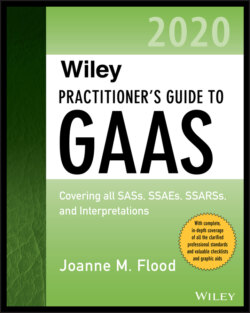Читать книгу Wiley Practitioner's Guide to GAAS 2020 - Joanne M. Flood - Страница 17
Ethical Requirements
ОглавлениеThe auditor must be independent. If not independent, the auditor cannot issue a report under GAAS. The only exception is if GAAS provides otherwise or law or regulation requires the auditor to accept the engagement and report on the financial statements. (AU-C 200.15) In that situation, AU-C 705, Modifications to the Opinion in the Independent Auditor’s Report, applies.
To be independent, the auditor must be intellectually honest; to be recognized as independent, he or she must be free from any obligation to or interest in the client, its management, or its owners. The auditor should be independent in appearance as well as fact. (AU-C 200.A17) For specific guidance, the auditor should look to the AICPA and the state society codes of conduct and, if relevant, the requirements of the Securities and Exchange Commission (SEC). (AU-C 210.A21)
Policies and procedures should provide reasonable assurance that personnel maintain independence when required and perform all responsibilities with integrity, objectivity, and due care.
1 Independence is an impartiality that recognizes an obligation for fairness.
2 Integrity pertains to being honest and candid, and requires that service and public trust not be subordinated to personal gain.
3 Objectivity is a state of mind that imposes an obligation to be impartial, intellectually honest, and free of conflicts of interest.
4 Due care requires the auditor to discharge professional responsibilities with the competence and diligence necessary to perform the audit and issue an appropriate report and to render services promptly, thoroughly, and carefully, while observing applicable standards. (AU-C 200.A19)
(AU-C 200.A16)
(See the AICPA’s Code of Professional Conduct, ET.0.300)
